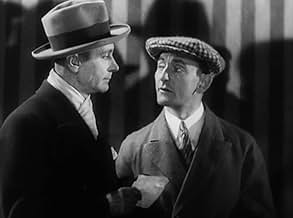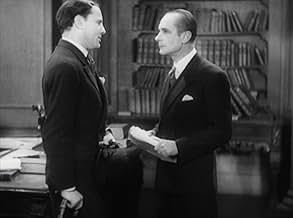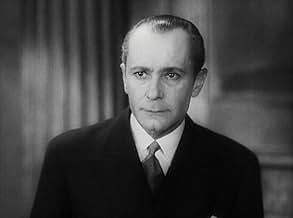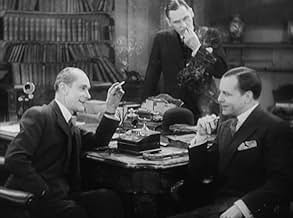Mary
- 1931
- 1h 18m
IMDb RATING
5.7/10
1.1K
YOUR RATING
A juror in a murder trial, after voting to convict, has second thoughts and begins to investigate on his own before the execution.A juror in a murder trial, after voting to convict, has second thoughts and begins to investigate on his own before the execution.A juror in a murder trial, after voting to convict, has second thoughts and begins to investigate on his own before the execution.
John Mylong
- John Stuart
- (as Jack Mylong-Münz)
Featured reviews
A woman is found murdered with another woman, Mary Baring, with whom she'd been heard to be arguing, present, in a daze. It seems like an open-and-shut case and Baring is put on trial for murder. During deliberations, 11 of the 12 members think she's guilty. The sceptical one is Sir John Menier who thinks there are holes in the case. However, he is talked round and Baring is found guilty. After the case Menier still has his doubts and wishes he'd been more forceful in arguing against a guilty verdict. He starts to do his own investigating.
In 1930 Alfred Hitchcock released Murder!, an intriguing murder-thriller. While Murder! Was being shot, Hitchcock was simultaneously making Mary, a German-language version of it, using the same sets but German actors. Mary is almost frame-for-frame and word-for-word (once translated!) the same as Murder! Though manages to run 19 minutes shorter. German must be a more succinct language than English...
The end result is almost as good as Murder! An original start, introducing much of the circumstances around the murder via a murder trial and introducing the main character, Menier, through the jury's deliberations.
The plot developments are good and the climax is quite Shakespearean, which is appropriate considering that the setting is the theatre and most of the characters are theatre actors and crew.
I watched the two films less than day apart and Murder! Was fresh in my mind when I watched Mary. Production values seem a bit lower on Mary and Hitchcock makes less use of clever camera angles in Mary. On the plus side, the irritating smash cuts in Murder! Are not there in Mary. Being longer, Murder! Seems more tension-filled too.
The subtitling on the version of Mary I watched was quite shonky, which also detracted from the film.
Now for the big question: why did Hitchcock make a German version of Murder!? I guess that sound in movies was so new and primitive that simply dubbing Murder! Into German wasn't an option. In the silent era a movie could easily be adapted into another language - just change the dialogue cards!
But why bother at all? My guess is that Germany was a large cinematic market and/or Hitchcock had a large fan base in Germany, hence a film specifically for that market. It's like (30 years later) the Beatles re-recording and releasing many of their early stuff in German.
It's worth noting that this was the one and only time Hitchcock made a foreign-language version of one of his movies. Either Mary wasn't as good an idea as he imagined or technology improved and soon after this his films were dubbed or sub-titled for foreign audiences.
In 1930 Alfred Hitchcock released Murder!, an intriguing murder-thriller. While Murder! Was being shot, Hitchcock was simultaneously making Mary, a German-language version of it, using the same sets but German actors. Mary is almost frame-for-frame and word-for-word (once translated!) the same as Murder! Though manages to run 19 minutes shorter. German must be a more succinct language than English...
The end result is almost as good as Murder! An original start, introducing much of the circumstances around the murder via a murder trial and introducing the main character, Menier, through the jury's deliberations.
The plot developments are good and the climax is quite Shakespearean, which is appropriate considering that the setting is the theatre and most of the characters are theatre actors and crew.
I watched the two films less than day apart and Murder! Was fresh in my mind when I watched Mary. Production values seem a bit lower on Mary and Hitchcock makes less use of clever camera angles in Mary. On the plus side, the irritating smash cuts in Murder! Are not there in Mary. Being longer, Murder! Seems more tension-filled too.
The subtitling on the version of Mary I watched was quite shonky, which also detracted from the film.
Now for the big question: why did Hitchcock make a German version of Murder!? I guess that sound in movies was so new and primitive that simply dubbing Murder! Into German wasn't an option. In the silent era a movie could easily be adapted into another language - just change the dialogue cards!
But why bother at all? My guess is that Germany was a large cinematic market and/or Hitchcock had a large fan base in Germany, hence a film specifically for that market. It's like (30 years later) the Beatles re-recording and releasing many of their early stuff in German.
It's worth noting that this was the one and only time Hitchcock made a foreign-language version of one of his movies. Either Mary wasn't as good an idea as he imagined or technology improved and soon after this his films were dubbed or sub-titled for foreign audiences.
This perfunctory German version of MURDER, filmed at the same time on the same sets but with a mostly different cast, is 28 minutes shorter than the English version! It leaves out all of the touches that make the English version enjoyable, and also leaves out some of the clues that lead to the murderer. Some of the things left out are: the jury member who hasn't a clue; the jury foreman having difficulty getting the ballots in the right piles; the jury filing out from the jury room into the court and Sir John waiting before getting up and joining them; the servant bringing the radio into the bathroom, and the colloquy with the servant at that point; the interior monologue is much shorter; dialogue in the scene immediately after is shorter (also, the bathroom and subsequent scene are sequenced wrong so that it seems he's shaving again after he finished); the landlady isn't present when the couple get the call from Sir John, and so the byplay about them owing the rent is not there; their frantic dressing and spiffing up for the Sir John visit; the shot of the stage manager's feet in a super-soft carpet, showing what it feels like to him; the scene where they look at the parlor with landlady is much shorter (and comes after scene where they look at her bedroom); tricking the landlady by using a high-pitched voice; Hitchcock's appearance in the street; tipping the theatre manager after they inspect the theatre; the scene with all the kids is much shorter, with the cat under the covers eliminated (same kids, though); the kids don't sit on the trunk, so the dialogue about the policeman's uniform in the trunk must not be there; the striking overhead shot of Mary in her cell, and the shadow of the noose; Sir John's scene with Mary is shorter, colder, and they don't talk about the theatre at the end; the scene of Sir John and the stage manager in the circus audience, where they talk about trapping the murderer with a Hamlet-like play is much shorter; when the murderer hangs himself, there's a somewhat more dramatic sound editing, perhaps to cover up the fact that he doesn't make a very good noose; the murderer carried out on a stretcher; the sequence of Sir John and Mary in the train is shorter; and the shot of the characters on stage at the end. Some of the jokes are still there but presented in so rudimentary a fashion that one would hardly notice. For example, when Sir John notices that his guest is using a small spoon for the soup, he does the same, and when he puts his martini olive on the tray, the guests don't know what to do with theirs; both these incidents still occur but with no reactions from the actors to point up the gags. Abel looks a lot like Marshall, which is very disconcerting because that British upper-class attitude that informs every aspect of the English version is completely lacking. The stage manager is an expressionless nonentity in this version. It's a second-hand, second-rate copy all through. One can hardly believe Hitchcock himself directed this totally lacking, colorless run-through of his delightful MURDER. You may never get a chance to see this one, which may frustrate Hitchcock completists, but, really, there's absolutely no reason to see it, even if you only understand German! See MURDER a second time instead.
Is it merely a German version of Hitchcock's "Murder!"? True both films are based on the same source-material. Yet the outcome is different. There is more emphasis on choice of camera and shots and editing in the German film than in the British one. The underlying cross dressing and gay aspects are more obvious in the German film. Yes "Mary'' can be considerably compared to Lumet's "12 Angry Men" made decades
later. Here the juror becomes the detective, while in Lumet's film the juror never really leaves the jury room. The relationship between juror and the accused is explored midway--a rare aspect in any jury-oriented tale. It is therefore goes one up on "Murder!" Further, Alfred Abel (a German actor) is superior to Herbert Marshall both playing the same character of the same tale, that of Sir John Menier. So is Olga Tschechowa playing the role of the accused actress, facing death sentence.
I am never entirely decided which out of John Ford and Alfred Hitchcock should be regarded as the most hugely over-rated director of all time. Sometimes I tend one way, sometimes the other.
It is not that Hitchcock did not make some very fine films; evidently he did. But he made some rather poor films too, particularly at the beginning and during the long end of his career. And even some of his good films are in doubtful taste and overly reliant on trademark gimmicks. The sycophantic attitude adopted by his admirers (the gullible idolator François Truffaut en tête) bear witness as much as anything to to his dominant personality and extraordinary talents as a self-publicist.
Neither the 1930 British version of this film nor the German version (shot simultaneously but only released in 1931) are very good. According to one reviewer the Germans would have liked more changes and this I can well believe. Hitchcock, who had learned most of what he knew from German film-makers really does not take advantage of the opportunity to be more adventurous in his cinematography and mise en scène in the way that marks the films of the great German directors up to this time (a golden age soon alas to be robbed of its glitter by the folly and philistinism of one Herr Hitler). Using German technical skills, he could have made a much superior version of this film.
Some changes the Germans did get. The British version is very seriously by the extremely unpleasant racist and homophobic tone of its conclusion (the villain being very clearly marked as a half-caste pansy to be ostracised on both accounts). As, to my astonishment - how protective people are of their icons! - only one reviewer to date seems to have pointed out, these unpleasant elements are removed in the German version. The character still works as an acrobat en travesti but the notion that he is homosexual (derived from the Dane novel) is hardly there at all and his motive for murder is no longer to conceal that he had "black blood" as in the English version (a notion that did not horrify the German public who, even under Hitler and whatever Hitler may have thought of it, gave a hugely warm and enthusiastic welcome to the athlete Jesse Owens five years later as Owens himself would testify sardonically on his return to a segregated USA. In this version Fane is simply an ex-convict wishing to conceal his criminal past.
It is easy to read history backwards in the manner of the egregious Siegfried Kracauer and forget that the Weimar period in Germany was in fact notable for its broad-mindedness (films treating homosexuality with sympathy such as Oswald's Anders als die Andern - which is also a plea for a change in the law - Dreyer's Michaêl or Dieterle's Geschlecht in Fesseln simply could not have been made at all in Britain at this time) and its multiculturalism. When the anti-semitic British short-story Saki had imagined a German invasion of Britain in his 1913 novel When William Came, what he feared most was not militarism or autocracy but the spread of a "cosmopolitan" culture (typically a euphemism for "jew" at the time) that would undermine the British identity.
Regarding Hitchcock and race, how many African American faces can you recall seeing in all the films that "the Master" made in the US, a period that included the life and death of Martin Luther King, the Civil Right movement, the Johnsonian legislation that transformed US society, the heyday of Mohamed Ali, the Black Panther movement?
So these important changes to this film are a reminder that as late as 1931 racism and homophobia that was perfectly acceptable in Britain was considered inappropriate in Germany. Two years later, alas, and both German state and cinema would be in the hands of suicidal and homicidal fanatics. Quel gachis!
It is not that Hitchcock did not make some very fine films; evidently he did. But he made some rather poor films too, particularly at the beginning and during the long end of his career. And even some of his good films are in doubtful taste and overly reliant on trademark gimmicks. The sycophantic attitude adopted by his admirers (the gullible idolator François Truffaut en tête) bear witness as much as anything to to his dominant personality and extraordinary talents as a self-publicist.
Neither the 1930 British version of this film nor the German version (shot simultaneously but only released in 1931) are very good. According to one reviewer the Germans would have liked more changes and this I can well believe. Hitchcock, who had learned most of what he knew from German film-makers really does not take advantage of the opportunity to be more adventurous in his cinematography and mise en scène in the way that marks the films of the great German directors up to this time (a golden age soon alas to be robbed of its glitter by the folly and philistinism of one Herr Hitler). Using German technical skills, he could have made a much superior version of this film.
Some changes the Germans did get. The British version is very seriously by the extremely unpleasant racist and homophobic tone of its conclusion (the villain being very clearly marked as a half-caste pansy to be ostracised on both accounts). As, to my astonishment - how protective people are of their icons! - only one reviewer to date seems to have pointed out, these unpleasant elements are removed in the German version. The character still works as an acrobat en travesti but the notion that he is homosexual (derived from the Dane novel) is hardly there at all and his motive for murder is no longer to conceal that he had "black blood" as in the English version (a notion that did not horrify the German public who, even under Hitler and whatever Hitler may have thought of it, gave a hugely warm and enthusiastic welcome to the athlete Jesse Owens five years later as Owens himself would testify sardonically on his return to a segregated USA. In this version Fane is simply an ex-convict wishing to conceal his criminal past.
It is easy to read history backwards in the manner of the egregious Siegfried Kracauer and forget that the Weimar period in Germany was in fact notable for its broad-mindedness (films treating homosexuality with sympathy such as Oswald's Anders als die Andern - which is also a plea for a change in the law - Dreyer's Michaêl or Dieterle's Geschlecht in Fesseln simply could not have been made at all in Britain at this time) and its multiculturalism. When the anti-semitic British short-story Saki had imagined a German invasion of Britain in his 1913 novel When William Came, what he feared most was not militarism or autocracy but the spread of a "cosmopolitan" culture (typically a euphemism for "jew" at the time) that would undermine the British identity.
Regarding Hitchcock and race, how many African American faces can you recall seeing in all the films that "the Master" made in the US, a period that included the life and death of Martin Luther King, the Civil Right movement, the Johnsonian legislation that transformed US society, the heyday of Mohamed Ali, the Black Panther movement?
So these important changes to this film are a reminder that as late as 1931 racism and homophobia that was perfectly acceptable in Britain was considered inappropriate in Germany. Two years later, alas, and both German state and cinema would be in the hands of suicidal and homicidal fanatics. Quel gachis!
For all practical purposes, a remake, in German, of "Murder!" It is stark and frantic, but the plot is the same. The editing is flawed and so things do not move fluidly. Also, the actors seem more stiff and less interesting. It's as if Hitchcock felt he could give the German people a gift, but move on quickly. I agree that the tension is much less. The final scene is one of the most dramatic of any the master produced, but here it doesn't have quite the same impact. See it only if you wish to have a full view of early Hitchcock films. That was my motivation.
Did you know
- TriviaA copy of the film is included as a bonus feature on the Kino Lorber Studio Classics DVD and German DVD releases of Murder! (1930) and the French DVD release of Jamaica Inn (1939).
- GoofsAs Sir John interviews Mary in jail, it is established in long-shot that both are sitting at opposite ends of a long table. During frontal closeups, the widths of the planks that make up the tabletop reveal that very randomly either the table is turning between shots or both persons repeatedly switch places.
The exact same continuity error also applies to the American version of the movie, Murder! (1930).
- ConnectionsAlternate-language version of Murder! (1930)
Details
- Runtime
- 1h 18m(78 min)
- Color
- Aspect ratio
- 1.20 : 1
Contribute to this page
Suggest an edit or add missing content


































